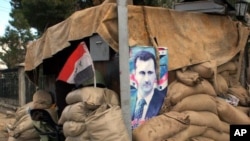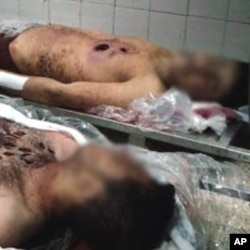Damascus has been spared much of the violence gripping Syria, although there are signs that the uprising is moving closer on the capital.
The body of a Syrian general is on its way to burial. Chopin's Funeral March merges with trilling laments and chants of pro-government slogans.
Watch related video clip:
Officials say General Mohammed Abdul-Hamid al Awad was on his way to work this week when an "armed terrorist group" attacked him outside his Damascus home.
His funeral procession is attended by Arab League monitors. Afterward, they are shown the bodies of at least six young men officials describe as soldiers killed in recent fighting.
A morgue official counts a total of 58 stab wounds to one body, many of them, he says, inflicted after the man died.
The post-mortem wounds raise questions, but many government accounts are rejected by the opposition as manipulated or fabricated.
Even without all the answers, the killing of a prominent military figure in the capital, once seemingly immune to the unrest, adds to fears following two suicide bombings in the past month.
In some ways, Damascus appears normal. Shops and restaurants are open, though financial sanctions have turned it into a cash-based system. More telling are the checkpoints and sandbagged positions around the city, speaking to fears of further troubles.
Amal, who gives just her first name, says the military is justified in its actions, in what she sees as a bid to maintain security. "People are killing each other because of sect, because of religion, because whatever it is. So the military needs to go on the streets because this is the country's military," she said. "If somebody is wrong, they need to enforce law."
Despite ongoing security efforts, the government has not been able to quell the unrest in towns ringing the capital. And in Zabadani, 40 kilometers away, opposition forces say they have reached a ceasefire with government troops. If confirmed, it would be a rare concession by the state on the military strength of its opponents.
| Join the conversation on our social journalism site - Middle East Voices. Follow our Middle East reports on Twitter and discuss them on our Facebook page. |





